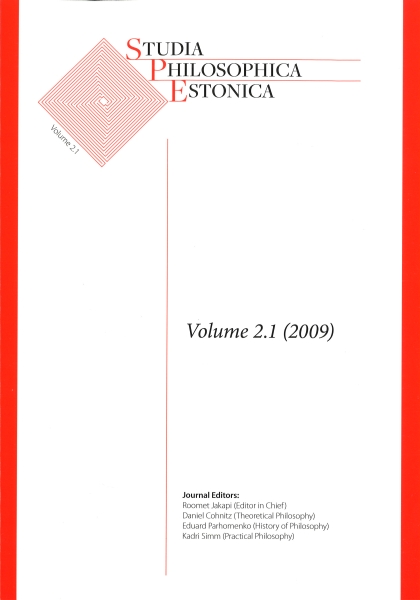Mis on filosoofia?
DOI:
https://doi.org/10.12697/spe.2009.2.1.02Keywords:
metafilosoofia, Sellars, ilmnev pilt, teaduslik pilt, metaphilosophy, manifest image, scientific imageAbstract
Minu eesmärgiks antud artiklis on pakkuda üht vaadet filosoofia olemuse, eesmärgi ja rolli kohta kaasaja maailmas. Artikli esimeses osas kirjeldan lühidalt nelja tänapäeva filosoofiat oluliselt mõjutanud filosoofiakontseptsiooni: ideaalkeele traditsiooni filosoofiamõistmist, tavakeele filosoofia arusaamu, Wittgensteini terapeutilis-deflatsionalistlikku kontseptsiooni ning kaasaegse filosoofilise naturalismi metafilosoofiat. Teises osas visandan Wilfrid Sellarsist inspireerituna filosoofiamõistmise, mis võimaldab meil näha kõiki eelnevalt käsitletud filosoofiakontseptsioone täitmas ühe ja sama projekti erinevaid osi ning mõista keskset osa kaasaja filosoofiast.
My main aim in this paper is to provide a certain sort of answer to the question 'What is philosophy?'. In the first part I will give a short overview of the central ideas of the four most dominant conceptions of philosophy of the 20th century: the ones supported by philosophers belonging to the ideal and the ordinary language traditions, the one suggested by later Wittgenstein, and the one championed by modern-day methodological naturalists. In the second part I will build on Wilfrid Sellars's ideas and sketch a conception of philosophy which amalgamates the four conceptions into one and sees philosophy as an intellectual activity that aims at constructing a comprehensive, true and practical worldview by, first, constructing both the manifest and the scientific images of man and world and, second, fitting them together.
Downloads
References
Austin, J.L. (2005). Kaitsekõne vabandustele, Akadeemia 11:2487-2520.
Brandom, R. (2001a). Articulating Reasons, Harvard University Press, Cambridge.
Brandom, R.(2001b). Reason, expression and the philosophic enterprise. C.P. Ragland ja S. Heidt (toim), What is Philosophy?, Yale University Press, New Haven, lk 74-95.
Chalmers, D. ja Jackson, F. (2001). Conceptual analysis and reductive explanation, The Philosophical Review 110:315-361.
Cohnitz, D. ja Rossberg, M. (2006). Nelson Goodman, Acumen, Chesham.
Grice, P. (1991a). Conceptual analysis and the province of philosophy, Studies in the Way of Words, Harvard University Press, Cambridge, lk 181-185.
Grice, P. (1991b). Post war Oxford philosophy, Studies in the Way of Words, Harvard University Press, Cambridge, lk 171-180.
Grice, P. (1991c). Retrospective epilogue, Studies in the Way of Words, Harvard University Press, Cambridge, lk 339-385.
Hegel, G. W. F. (2002). Hegel’s Philosophy of Right, Focus Publishing, Newburyport. Tõlk. Alan White.
Horwich, P. (2005a). From a Deflationary Point of View, Oxford University Press, Oxford.
Horwich, P. (2005b). Wittgenstein’s meta-philosophical development, From a Deflationary Point of View, Oxford University Press, Oxford, lk 159-171.
Hume, D. (1978). A Treatise of Human Nature, 2.tr, Clarendon Press.
Husserl, E. (1965). Philosophy as a rigorous science, Phenomenology and the Crisis of Philosophy, Harper & Row, New York, lk 71-147.
Jackson, F. (1997). From Metaphysics to Ethics: A Defence of Conceptual Analysis, Clarendon Press, Oxford.
Kant, I. (2000). The Critique of Pure Reason, Cambridge University Press, Cambridge.
Knobe, J. (2007). Experimental philosophy, Philosophy Compass 2:81-92.
Kripke, S. (1982). Wittgenstein on Rules and Private Language, Harvard University Press, Cambridge.
Marx, K. (2005). Theses on Feuerbach. D. McLellan (toim), Selected Writings, 2.tr, Oxford University Press, Oxford, lk 171-174.
McDowell, J. (1996). Mind and World, Harvard University Press, Cambridge.
Moore, G.E. (1962). A defence of common sense, Philosophical Papers, Collier Books, New York.
Papineau, D. (2007). Naturalism. E.N. Zalta (toim), Stanford Encyclopedia of Philosophy. URL: http://plato.stanford.edu/archives/spr2007/entries/naturalism/
Perry, J. (1979). The essential indexical, Nous 13:3-21.
Pettit, P. (2004). Existentialism, quietism, and the role of philosophy. B. Leiter (toim), The Future for Philosophy, Oxford University Press, Oxford, lk 304-327.
Roberts, J.R. (2007). A Metaphysics for the Mob: The Philosophy of George Berkeley, Oxford University Press, Oxford.
Rorty, R. (1979). Philosophy and the Mirror of Nature, Princeton University Press, Princeton.
Russell, B. (1959). The Main Problems of Philosophy, Oxford University Press, Oxford.
Ryle, G. (1963). The theory of meaning. C.E. Caton (toim), Philosophy and Ordinary Language, University of Illinois Press, Chicago, lk 128-153.
Ryle, G. (1964). Dilemmas, Cambridge University Press, Cambridge.
Ryle, G. (2000). The Concept of Mind, University of Chicago Press, Chicago.
Sellars, W. (1991a). Empiricism and the philosophy of mind, Science, Perception and Reality, Ridgeview, Atascadero, lk 127-196.
Sellars, W. (1991b). Philosophy and the scientific image of man, Science, Perception and Reality, Ridgeview, Atascadero, lk 1-40.
Smith, M. (1994). The Moral Problem, Blackwell, Oxford.
Strawson, P. (1971). Individuals, Methuen, London.
Strawson, P. (1974). Freedom and resentment,Freedom and Resentment and other essays, Methuen, London, lk 1-25.
Strawson, P. (1992). Analysis and Metaphysics, Oxford University Press, Oxford.
Stroud, B. (2001). What is philosophy?. C.P. Ragland ja S. Heidt (toim), What is Philosophy?, Yale University Press, New Haven, lk 25-46.
Wittgenstein, L. (2005). Filosoofilised Uurimused, Ilmamaa, Tartu. Tõlk. Andres Luure.
Wood, A. (2001). Enlightenment apology, enlightenment critique. C.P. Ragland ja S.Heidt (toim), What is Philosophy?, Yale University Press, New Haven, lk 96-120

